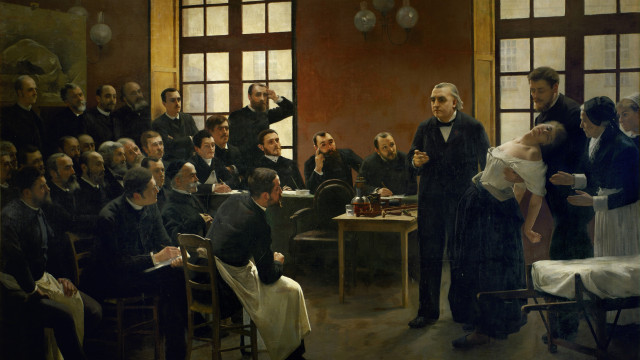





























See Also
See Again
© Shutterstock
0 / 30 Fotos
What is tinnitus?
- Tinnitus is the perception of sound, often described as ringing, buzzing, or hissing, in the ears or head without an external source.
© Shutterstock
1 / 30 Fotos
Prevalence
- It affects about 15-20% of the global population, with varying degrees of severity.
© Shutterstock
2 / 30 Fotos
Common causes
- Tinnitus is often caused by exposure to loud noises, ear infections, earwax buildup, or age-related hearing loss.
© Shutterstock
3 / 30 Fotos
Types of tinnitus
- Tinnitus can be classified into two types: subjective tinnitus (heard only by the person) and objective tinnitus (heard by both the person and a doctor).
© Shutterstock
4 / 30 Fotos
Symptoms
- The primary symptom is the perception of sound, but it may also be accompanied by hearing loss or a feeling of fullness in the ear.
© Shutterstock
5 / 30 Fotos
Loud noises
- Exposure to loud noises, such as concerts, machinery, or headphones, is a leading cause of tinnitus.
© Shutterstock
6 / 30 Fotos
Age-related hearing loss
- As people age, their hearing deteriorates, which can lead to the development of tinnitus.
© Shutterstock
7 / 30 Fotos
Medications
- Certain medications, like aspirin, diuretics, or antidepressants, can trigger or worsen tinnitus as a side effect.
© Shutterstock
8 / 30 Fotos
Head and neck injuries
- Trauma to the head or neck can affect the auditory system, potentially leading to tinnitus.
© Shutterstock
9 / 30 Fotos
Stress
- Mental and emotional stress can exacerbate the perception of tinnitus or even trigger it.
© Shutterstock
10 / 30 Fotos
Ear infections
- Infections in the middle or inner ear can cause temporary or permanent tinnitus.
© Shutterstock
11 / 30 Fotos
Eustachian tube dysfunction
- Issues with the Eustachian tube, which regulates pressure in the ear, can lead to tinnitus.
© Shutterstock
12 / 30 Fotos
Earwax buildup
- Excessive earwax can block the ear canal, causing a temporary ringing sound.
© Shutterstock
13 / 30 Fotos
Meniere's disease
- Meniere's disease is an inner ear condition that leads to tinnitus, vertigo, and hearing loss, often causing episodes of dizziness and imbalance.
© Shutterstock
14 / 30 Fotos
TMJ disorders
- Problems with the temporomandibular joint (TMJ) can contribute to tinnitus due to its proximity to the ear.
© Shutterstock
15 / 30 Fotos
Hyperacusis
- Hyperacusis is heightened sensitivity to sound, often accompanying tinnitus, making everyday noises unbearably loud and causing discomfort in normal auditory processing.
© Shutterstock
16 / 30 Fotos
Caffeine and alcohol
- Some people find that consuming caffeine or alcohol can exacerbate tinnitus symptoms, making the ringing or buzzing in the ears more noticeable or intense.
© Shutterstock
17 / 30 Fotos
Dietary factors
- Some individuals may find that consuming certain foods, particularly salty or fatty options, can worsen their tinnitus symptoms.
© Shutterstock
18 / 30 Fotos
Pulsatile tinnitus
- This is a type of tinnitus where the sound pulses in rhythm with the person's heartbeat. It may indicate blood vessel issues.
© Shutterstock
19 / 30 Fotos
Non-pulsatile tinnitus
- This is the most common form of tinnitus, where the sound is constant and doesn't match the heartbeat.
© Shutterstock
20 / 30 Fotos
No cure
- There's no definitive cure for tinnitus, but various treatments focus on managing symptoms and helping individuals reduce discomfort.
© Shutterstock
21 / 30 Fotos
Sound therapy
- Using background noise or white noise can help mask the ringing associated with tinnitus, making it less noticeable and providing a calming effect.
© Shutterstock
22 / 30 Fotos
Cognitive behavioral therapy (CBT) - CBT helps patients manage the emotional and psychological impact of tinnitus by addressing negative thought patterns, reducing stress and anxiety, and improving their overall ability to cope.
© Shutterstock
23 / 30 Fotos
Hearing aids
- For those with hearing loss, hearing aids can improve sound clarity and help alleviate tinnitus symptoms.
© Shutterstock
24 / 30 Fotos
Tinnitus retraining therapy (TRT)
- TRT is a therapeutic approach combining sound therapy and counseling, designed to help the brain reclassify and ultimately ignore the tinnitus sound over time.
© Shutterstock
25 / 30 Fotos
Acupuncture
- Some individuals find relief from tinnitus through acupuncture, an alternative therapy that involves stimulating specific points in the body to promote relaxation.
© Shutterstock
26 / 30 Fotos
Gingko biloba
- Gingko biloba is a herbal remedy occasionally used to manage tinnitus symptoms, though clinical research provides limited evidence supporting its effectiveness.
© Getty Images
27 / 30 Fotos
Self-care techniques
- Practicing relaxation techniques, such as mindfulness meditation and deep breathing exercises, can help to manage tinnitus symptoms more effectively over time.
© Shutterstock
28 / 30 Fotos
Consulting a specialist
- If tinnitus is persistent or bothersome, it's important to consult an audiologist or tinnitus specialist for evaluation and management. Sources: (Mayo Clinic) (Better Health Channel) (National Institute on Deafness and Other Communication Disorders) See also: Things that are damaging your hearing
© Shutterstock
29 / 30 Fotos
© Shutterstock
0 / 30 Fotos
What is tinnitus?
- Tinnitus is the perception of sound, often described as ringing, buzzing, or hissing, in the ears or head without an external source.
© Shutterstock
1 / 30 Fotos
Prevalence
- It affects about 15-20% of the global population, with varying degrees of severity.
© Shutterstock
2 / 30 Fotos
Common causes
- Tinnitus is often caused by exposure to loud noises, ear infections, earwax buildup, or age-related hearing loss.
© Shutterstock
3 / 30 Fotos
Types of tinnitus
- Tinnitus can be classified into two types: subjective tinnitus (heard only by the person) and objective tinnitus (heard by both the person and a doctor).
© Shutterstock
4 / 30 Fotos
Symptoms
- The primary symptom is the perception of sound, but it may also be accompanied by hearing loss or a feeling of fullness in the ear.
© Shutterstock
5 / 30 Fotos
Loud noises
- Exposure to loud noises, such as concerts, machinery, or headphones, is a leading cause of tinnitus.
© Shutterstock
6 / 30 Fotos
Age-related hearing loss
- As people age, their hearing deteriorates, which can lead to the development of tinnitus.
© Shutterstock
7 / 30 Fotos
Medications
- Certain medications, like aspirin, diuretics, or antidepressants, can trigger or worsen tinnitus as a side effect.
© Shutterstock
8 / 30 Fotos
Head and neck injuries
- Trauma to the head or neck can affect the auditory system, potentially leading to tinnitus.
© Shutterstock
9 / 30 Fotos
Stress
- Mental and emotional stress can exacerbate the perception of tinnitus or even trigger it.
© Shutterstock
10 / 30 Fotos
Ear infections
- Infections in the middle or inner ear can cause temporary or permanent tinnitus.
© Shutterstock
11 / 30 Fotos
Eustachian tube dysfunction
- Issues with the Eustachian tube, which regulates pressure in the ear, can lead to tinnitus.
© Shutterstock
12 / 30 Fotos
Earwax buildup
- Excessive earwax can block the ear canal, causing a temporary ringing sound.
© Shutterstock
13 / 30 Fotos
Meniere's disease
- Meniere's disease is an inner ear condition that leads to tinnitus, vertigo, and hearing loss, often causing episodes of dizziness and imbalance.
© Shutterstock
14 / 30 Fotos
TMJ disorders
- Problems with the temporomandibular joint (TMJ) can contribute to tinnitus due to its proximity to the ear.
© Shutterstock
15 / 30 Fotos
Hyperacusis
- Hyperacusis is heightened sensitivity to sound, often accompanying tinnitus, making everyday noises unbearably loud and causing discomfort in normal auditory processing.
© Shutterstock
16 / 30 Fotos
Caffeine and alcohol
- Some people find that consuming caffeine or alcohol can exacerbate tinnitus symptoms, making the ringing or buzzing in the ears more noticeable or intense.
© Shutterstock
17 / 30 Fotos
Dietary factors
- Some individuals may find that consuming certain foods, particularly salty or fatty options, can worsen their tinnitus symptoms.
© Shutterstock
18 / 30 Fotos
Pulsatile tinnitus
- This is a type of tinnitus where the sound pulses in rhythm with the person's heartbeat. It may indicate blood vessel issues.
© Shutterstock
19 / 30 Fotos
Non-pulsatile tinnitus
- This is the most common form of tinnitus, where the sound is constant and doesn't match the heartbeat.
© Shutterstock
20 / 30 Fotos
No cure
- There's no definitive cure for tinnitus, but various treatments focus on managing symptoms and helping individuals reduce discomfort.
© Shutterstock
21 / 30 Fotos
Sound therapy
- Using background noise or white noise can help mask the ringing associated with tinnitus, making it less noticeable and providing a calming effect.
© Shutterstock
22 / 30 Fotos
Cognitive behavioral therapy (CBT) - CBT helps patients manage the emotional and psychological impact of tinnitus by addressing negative thought patterns, reducing stress and anxiety, and improving their overall ability to cope.
© Shutterstock
23 / 30 Fotos
Hearing aids
- For those with hearing loss, hearing aids can improve sound clarity and help alleviate tinnitus symptoms.
© Shutterstock
24 / 30 Fotos
Tinnitus retraining therapy (TRT)
- TRT is a therapeutic approach combining sound therapy and counseling, designed to help the brain reclassify and ultimately ignore the tinnitus sound over time.
© Shutterstock
25 / 30 Fotos
Acupuncture
- Some individuals find relief from tinnitus through acupuncture, an alternative therapy that involves stimulating specific points in the body to promote relaxation.
© Shutterstock
26 / 30 Fotos
Gingko biloba
- Gingko biloba is a herbal remedy occasionally used to manage tinnitus symptoms, though clinical research provides limited evidence supporting its effectiveness.
© Getty Images
27 / 30 Fotos
Self-care techniques
- Practicing relaxation techniques, such as mindfulness meditation and deep breathing exercises, can help to manage tinnitus symptoms more effectively over time.
© Shutterstock
28 / 30 Fotos
Consulting a specialist
- If tinnitus is persistent or bothersome, it's important to consult an audiologist or tinnitus specialist for evaluation and management. Sources: (Mayo Clinic) (Better Health Channel) (National Institute on Deafness and Other Communication Disorders) See also: Things that are damaging your hearing
© Shutterstock
29 / 30 Fotos
Your guide to understanding tinnitus
Understanding the causes, symptoms, and treatments of tinnitus
© Shutterstock
Tinnitus, often described as a ringing, buzzing, or humming in the ears, affects millions of people worldwide. For some, it's a minor annoyance, while for others, it can significantly impact daily life. This condition isn't a disease, but a symptom of underlying issues, ranging from noise exposure to health conditions. Understanding tinnitus can make a huge difference for those navigating its challenges.
Click on to explore everything you need to know about tinnitus.
RECOMMENDED FOR YOU






























MOST READ
- Last Hour
- Last Day
- Last Week








